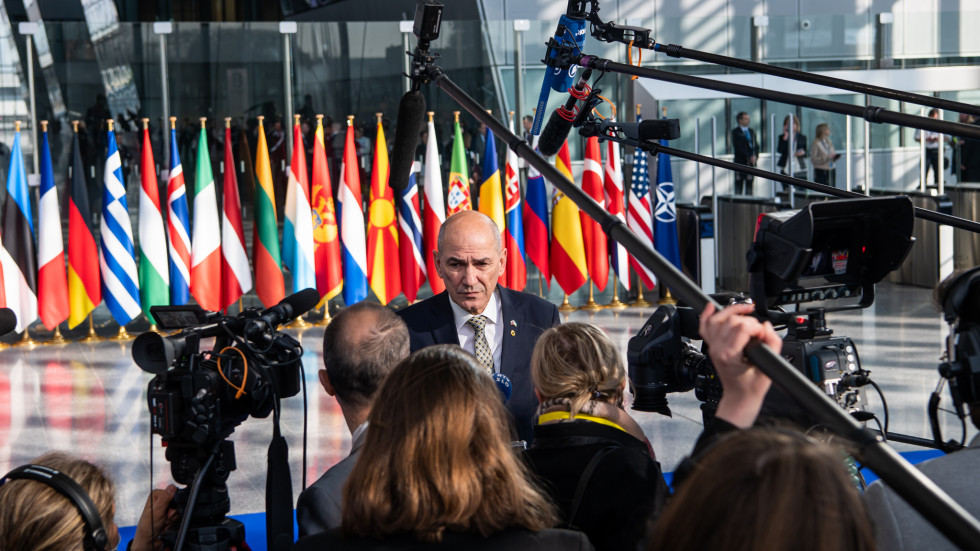By: UKOM
Prime Minister Janez Janša yesterday attended the extraordinary summit of NATO Heads of State and Government in Brussels to discuss the Russian aggression in Ukraine and current developments in NATO related to the situation in that country.
As part of the short-term response, efforts are continuing within NATO to establish four new battlegroups in southeastern Europe. Slovenia will participate in such a new group in Slovakia, which is to be established under the leadership of the Czech Republic, with up to 200 soldiers. The key guiding principle for all the Alliance’s activities, apart from the Allies’ assistance to Ukraine, is to prevent the war in Ukraine from spilling over into the territory of the Allies. Leaders will continue to discuss a more long-term adjustment of the deterrence and defence posture in the eastern wing of the Alliance and the role of Belarus and China in the Ukraine crisis.
In his statement to the press after his arrival at the summit, Prime Minister Janša said that Slovenia would deploy 200 Slovenian soldiers, i.e. a battalion battle group, to Slovakia. “The decision has already been taken, this is about cooperation with other NATO member states,” he said in this regard. “Our diplomatic mission is going to Ukraine, the procedures are being finalised, but it is not a military mission, as some have wrongly reported, it is a diplomatic mission led by the chargé d’affaires which will work for peace in Ukraine and help all those who remain in Kyiv and who are working through diplomatic channels to end the war,” he said. In this regard, he stressed that a mission on behalf of the EU was a different thing. “Discussions about this are ongoing and will continue today; however, our mission involves the chargé d’affaires of the Slovenian Foreign Ministry, who will represent Slovenia.”
Commenting on the probability of a Russian attack using chemical and biological weapons, the Prime Minister said that Slovenia has certain capacities to resist such attacks. Personally, he believes that, in this context, the risk was rather related to the aggressor Russian army attacking chemical plants or facilities, at which leaks can occur, while “a direct use of chemical and biological weapons by the Russian forces is less likely, because that would be shot in the foot”. “We are concerned to see that the aggressor Russian army is surrounding chemical plants, but I do not believe that the Russian army would use chemical or biological weapons to gain a tactical advantage, because this would be very unwise, as it would cause a large-scale disaster,” explained the Prime Minister.
As far as the increase in defence spending is concerned, the Prime Minister said that Slovenia had been among the countries with the least investment in defence and “although the act to strengthen investment in the Slovenian army that was adopted during this term of office will improve Slovenia’s position, additional efforts will be required in this regard.”
On his journey to Kyiv last week, the Prime Minister Janša said that he travelled there to show support for the Ukrainian people. “Ukraine needs hope and the awareness that they have not been forsaken, they need modern weapons, money and humanitarian aid to survive in this situation of reduced economic activity. We have discussed this in detail with the Ukrainian leaders and we have some important messages for our NATO colleagues and the EU leaders,” said the Prime Minister.
“We are doing all we can to strengthen Ukraine, to help it defend itself, because this way we also support Moldova and Georgia. When speaking about a political response to these challenges, I believe that accelerated negotiations on the EU membership are beneficial, which is why we strongly support the negotiations and accession of all these countries to the EU,” said the Prime Minister in his reply to the question on the European perspective of Ukraine, Moldova and Georgia.
Concerning the situation in Bosnia, the Prime Minister stated that certain defence forces in Bosnia have already been preventively strengthened following a timely proposal made by Josep Borell. “At the moment, political tensions exist and we regret that the negotiations on the new election act collapsed yesterday, although an agreement should be reached. Currently, we must stop the Russian aggression in Ukraine, because this is very important for Bosnia as well. If the war in Ukraine continues, the consequences of this conflict will be felt everywhere, especially in that part of the Western Balkans where issues remain unsolved,” concluded the Prime Minister.
Source: gov.si

